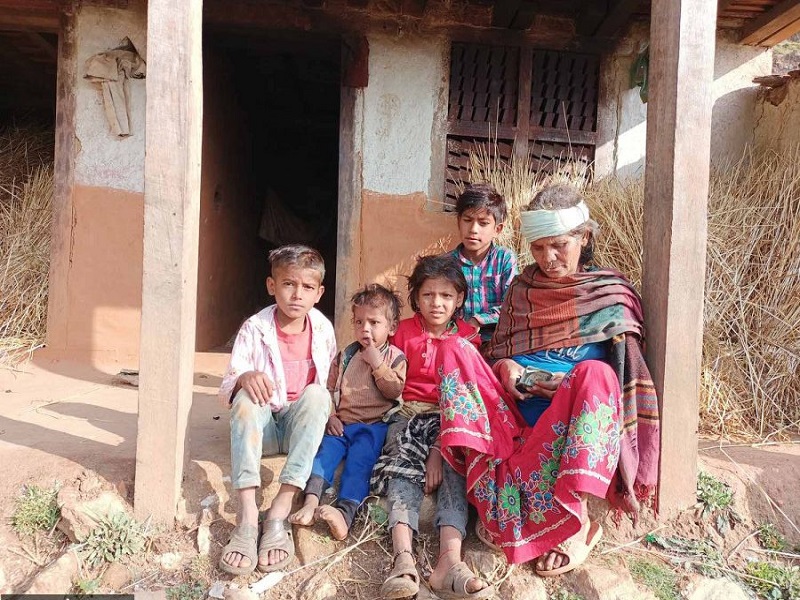Purnakala Nepali, a 31-year-old resident of Nepalibada in Turmakhand Rural Municipality-1, died of delivery complications while she was giving birth to her fifth child in September last year. Her husband had died just two months earlier. Four of their children--aged 2 to 13--have become orphans.
Purnakala died for want of treatment, health workers say.
"She was brought to the health post only when she was in a critical condition," said Gita Lamsal, an auxiliary nursing midwife at Rahaph Health Post. According to her, Purnakala's family relied on shamans to cure her of her ailment and delayed taking her to the health post. "The family kept her at home even when she was suffering. It was too late to save her or the baby when she was brought here. She died 20 minutes after her arrival."
After his mother's death, Purnakala's 13-year-old son left for India to look for work. He has left his two younger brothers and a sister with his elderly grandparents. The poverty-stricken elderly couple has not been able to take care of their grandchildren and is finding it challenging to provide even basic needs like food and clothes to their orphaned grandchildren.
"Our son died untimely. Purnakala also died while giving birth to the fifth child. Our grandchildren are with us but we're having a tough time raising them. We haven't received help from anyone. Neither the government nor any social organisations have come forward to help us," said Lalita Nepali, Purnakala's 65-year-old mother-in-law.
Nepalibada is a Dalit settlement in Turmakhand, a remote local unit in Achham district. It is around 200km away from Mangalsen, the district headquarters. The residents of the settlement are victims of illiteracy, poverty, superstition and a lack of development infrastructures.
Nepalibada residents generally do not go to health facilities unless in critical condition. They instead rely on faith healers and use locally available medicinal herbs to treat ailments.
Namsara BK, aged 38, died nine months ago as she could not get timely treatment. When she was eight months pregnant, she started experiencing pain in her abdomen and started bleeding. But her family members did not take her to a hospital.
"Nobody thought of taking her to a health facility. It was the day of offering prayer to our family deity. Namsara's husband is a Dhami (a faith healer) so the family members decided to keep her at home and treat her through traditional healing practices such as offering prayers to our deity," said Gopa BK, Namsara's brother-in-law. "We had agreed to take her to the health post the next day if her health continued to worsen but we didn't get the chance."
Namsara, according to Gopa, collapsed while the family members were busy offering prayers. She was rushed to Turmakhad Health Post, which is around an hour's walk away from their home.
"Her health was very critical when we took her to the health post. She was referred to the district hospital but died on the way," Gopa said. "We did not know that the government rescues critically ill pregnant women in helicopters or else we would have made use of the service. And nobody informed us about it."
According to him, this was Namsara's sixth pregnancy. Namsara has three sons and two daughters. "When she got pregnant, she accepted her pregnancy as a blessing from the deity and did not think she would run into health complications," said Gopa.
Like Purnakala and Namsara, many women, mainly from the remote villages of Achham, die due to delivery-related complications every year. The safe motherhood programme launched by the government has proved ineffective in Achham, a remote hill district of Sudurpaschim Province.
According to the data available at the Health Office in Achham, 25 percent of pregnant women in the district gave birth at home in the last fiscal year. There are a total of 65 birthing centres in the district. However, many rural women are still deprived of safe motherhood services due to illiteracy, poverty and a lack of public health awareness. According to the health workers, geographical remoteness and a lack of transportation are two other challenges to safe motherhood in Achham district.
Source: Kathmandupost
0 COMMENTS



